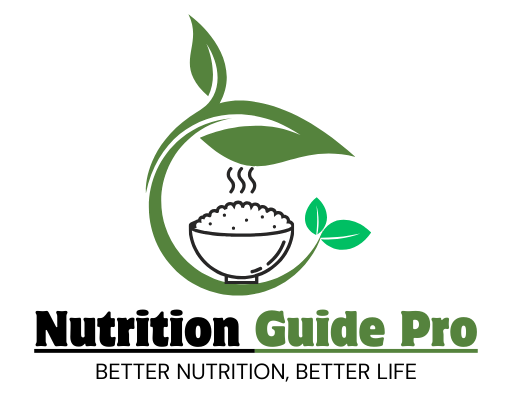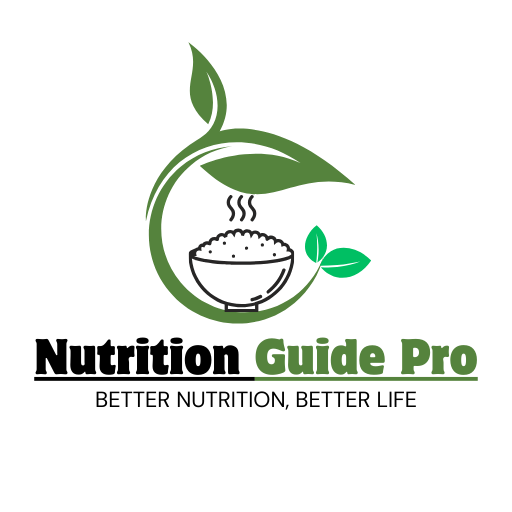When your child gets sick with common illnesses like colds, fevers, diarrhea, or a sore throat, it’s important to focus on their nutrition and hydration. Young kids, especially little ones under ages seven or eight, have immune systems that are still maturing, making them more susceptible to catching bugs, especially in daycare or school settings.
To support their recovery and get them feeling better faster, it’s essential to offer balanced foods and fluids that help them stay hydrated and fueled during their illness. The goal is to ensure they are comfortable and well-nourished while their body fights off the virus.
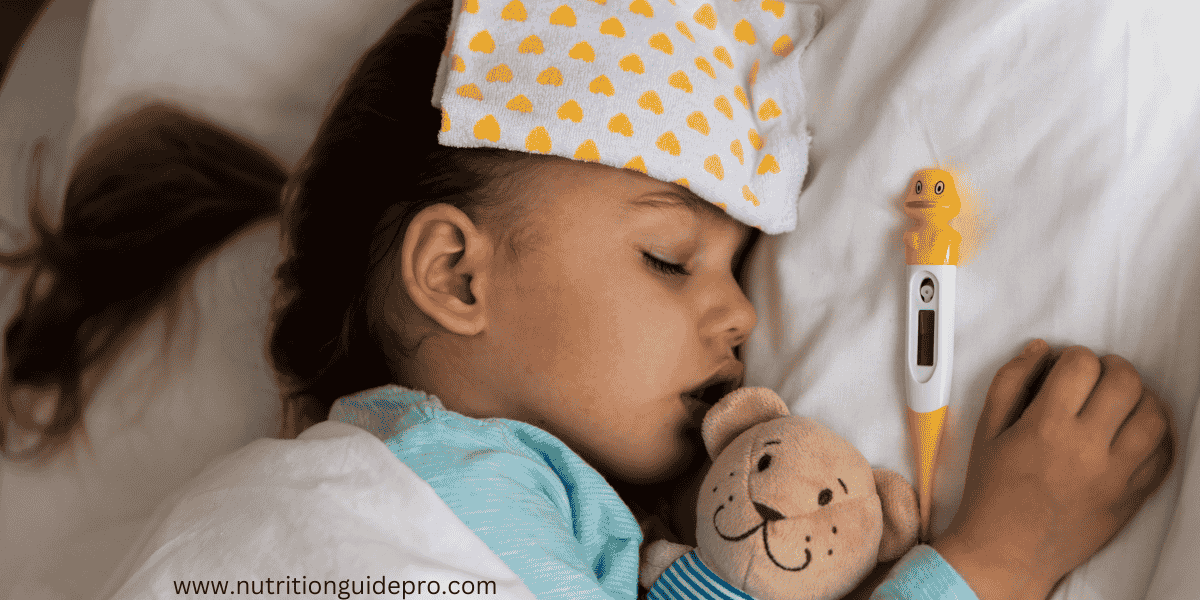
While dealing with an illness, children may experience sneezing, cough, or even an upset tummy. During this time, keeping them hydrated with diluted fruit juices, water, or warm broth is crucial. Older kids might also benefit from herbal teas with a touch of honey and lemon to soothe a sore throat.
To help them recover, it’s important to follow your pediatrician’s recommendations and keep their energy up with easily digestible foods like soup. With the right care and attention, your child will be back on their feet in no time, ready to stay healthy for the rest of the year.
General Nutrition Tips for Sick Children
Feeding your sick child tips can make a big difference in their comfort and recovery. Some nutrition tips are given below:
- Kids may have a low appetite when sick, so provide foods they can tolerate and easily digest.
- Keeping children hydrated is crucial, especially during vomiting or diarrhea.
- Offer six small, frequent meals instead of three larger meals to support their digestive system.
- Smaller meals are easier for their stomachs to handle.
- Ensure meals are gentle on their system while keeping hydration a key factor throughout the day.
Indulge Child With Their Favorites
When your sick child isn’t eating well, Nutritional protein for kids can help support recovery, even in small amounts. To make mealtime more appealing, focus on their favorite foods. Try mini meals that are easier to digest, like bananas, toast, or applesauce. These simple starches are gentle on the stomach and help provide the energy your child needs without overwhelming them.
Offering frequent small meals can also be beneficial, especially if they are feeling queasy or have been battling a diarrhea diet. Foods like rice and noodles are typically well-tolerated and can be served in fun, inviting ways to encourage eating.
As a parent, I’ve experienced the challenge of finding the best foods for my children when they are under the weather. It’s essential to avoid forcing them to eat things they don’t want, such as fried foods or greasy foods that might upset their stomach. Instead, think of ways to present hearty, nutrient-filled options that align with their tastes.
Best Foods for Different Symptoms
Vomiting or Diarrhea
When kids have a stomach bug and are dealing with vomiting or diarrhea, it’s important to keep them hydrated to avoid dehydration, which is a common concern. Offer smaller meals with easy-to-digest and nutrient-dense. Avoid greasy foods and sugary drinks, as they can make diarrhea worse, and focus on slowly replacing the fluids lost.
The food you should give to kids in this situation is given below:
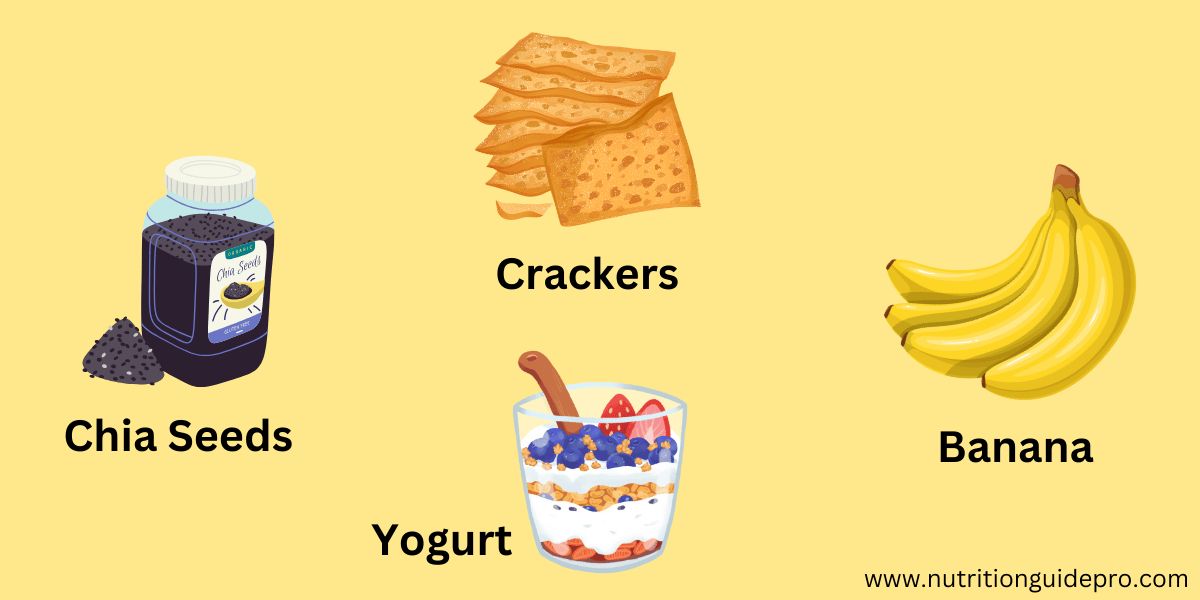
- Bananas
Bananas are rich in potassium and contain pectin and prebiotic fiber that help with digestion. Offering unripe bananas may be especially helpful as they contain resistant starch, which can help reduce the frequency of diarrhea. A study showed that children aged 9 months to 5 years with acute watery diarrhea experienced symptom improvement within 72 hours when given cooked green bananas alongside standard clinical care, making this fruit a great option for recovery.
- Crackers
Crackers and pretzels are great options when your child is sick because they are salty, plain foods that can help replace electrolytes lost during vomiting. These simple starches, like white bread, are low in fiber and are easier to digest, making them perfect for kids who may struggle to eat when they are unwell.
- Chia Seeds
Chia seeds are a simple way to help when your child is experiencing diarrhea. They are packed with soluble fiber that binds to water, helping to absorb extra fluid and improve stool consistency. You can easily mix chia into a fruit smoothie, add it to yogurt, or sprinkle it over plain cereal to make meals more enjoyable for your child. This will not only help them feel better but also keep their tummies comfortable while minimizing discomfort.
- Yogurt
Yogurt and kefir are great foods to offer kids when they have diarrhea. Research suggests that these fermented products are rich in probiotics, which are live microorganisms that help improve digestion and fight harmful bacteria present in their bodies. These beneficial bacteria can support your child’s recovery by strengthening their digestive system.
Common Cold and Flu
The food you should give to your kids in this situation is given below:
- Strawberries
When your sick child isn’t eating much, offering strawberries can be a delicious way to help them get better. These berries are packed with vitamin C, providing 95% of the daily value needed to support immune health. Research shows that the high doses of antioxidants, polyphenols, and flavonoids in strawberries can help prevent and treat upper respiratory infections.
They also contain important nutrients like potassium, folate, and fiber, which can aid recovery. To make it fun, you can blend strawberries into a smoothie, freeze them into popsicles for a soothing sore throat, or mix them into yogurt for extra support. Adding strawberries to your child’s meals not only helps nourish them but also supports their health during sickness.
- Eggs
Eggs are a cost-effective food that can play a crucial role in supporting your child’s recovery. Packed with nutrients like vitamin D and zinc, they can help boost immunity and may even shorten the duration and severity of a common cold. They are versatile and easy to prepare, making them an excellent choice for a small appetite while providing essential support during this time.
- Peanut Butter
When your kids are sick, adding peanut butter to their meals can be a smart choice. It’s a rich source of protein that provides around 10g per serving, helping with muscle repair and boosting their immunity.
Additionally, peanut butter contains important nutrients like zinc and vitamin E, which are vital for metabolic regulation and overall health. This high-quality, plant-based food gives about 10% of the recommended daily value of vitamin E, serving as a powerful antioxidant that helps your child recover faster. In my experience, kids love it spread on toast or mixed into smoothies, making it an easy way to get them to eat while they’re feeling under the weather.
- Watermelon
When your kids are feeling unwell, offering watermelon can help replenish their fluids. This juicy fruit, which is made up of about 91% water, is perfect for supporting their hydration needs, especially when they have fevers, and it provides essential vitamin A and vitamin C to help them recover faster.
- Baked or Mashed Potatoes
When your child is sick, baked or mashed potatoes can be a great choice because they are soft and easy to digest. These bland options provide higher calories, making them important for helping your child regain energy while delivering essential carbohydrates and potassium, which are key nutrients for recovery.
Fluids to Keep Hydration Up
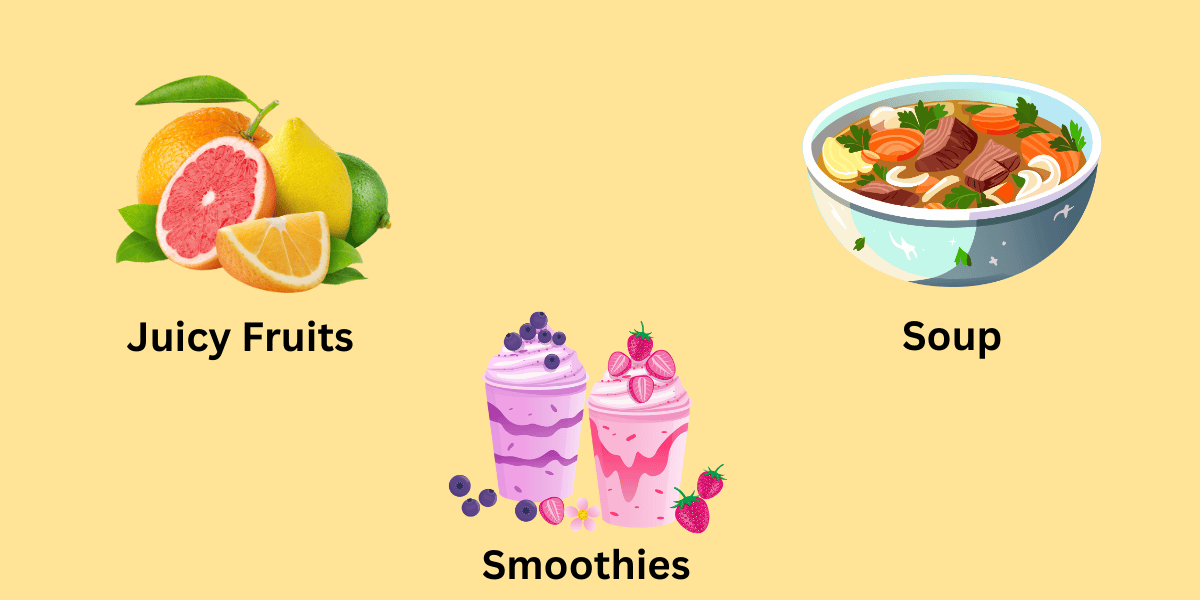
- Soup
When your child is feeling unwell, a warm bowl of soup or broth can be soothing and provide essential hydration. Whether they have a sore throat or an upset stomach, sipping on liquids like bone broth not only offers a good source of protein, but it’s also easy for them to enjoy when they may not want to eat much else.
While preparing a comforting bowl of soup, I often find that adding soft veggies can enhance the flavor without overwhelming their sensitive tummy. Watching my little ones sip on it brings me peace, knowing they’re getting the nutrients they need to feel better.
- Juicy Fruits
When your child is feeling unwell, staying hydrated is key to helping them feel better. Offering hydration through bland options like banana and applesauce can be very effective, especially if they have an upset stomach from a gastrointestinal bug; these options are gentle and easy to tolerate while still providing the necessary fluid to keep them comfortable.
- Popsicles or Smoothies
When kids are sick with a cold and experience congestion or a scratchy throat, popsicles and smoothies can be soothing options. Homemade or store-bought, these smooth treats provide much-needed fluid and essential nutrients that help them feel better, making it easier for them to recover from their cough.
Bottom Line
When your child is sick, providing the right nourishment can make a huge difference in their recovery. Focus on nutrient-dense, easily digestible foods and keep them hydrated with plenty of fluids. Offering small, frequent meals instead of large ones helps ensure their energy needs are met without overwhelming their delicate system. Encourage them to eat familiar favorites, which can be comforting during illness, but avoid greasy or rich foods that may upset their stomach further. Always prioritize their health and consult a pediatrician if you’re concerned about their intake or recovery process.
Frequently Asked Questions (FAQs)
What do you feed a sick child?
When your child is feeling sick, it’s important to offer foods that are easy to digest. The BRAT diet—which includes bananas, rice, applesauce, and toast—is gentle on the stomach and increases the likelihood of the food staying down. These foods are mild, making your child feel better without overwhelming their system. While there are many other options, starting with these simple foods can be a safe choice until your child feels well enough for more variety.
How to get a child to eat when sick?
When your child is sick, they might have a poor appetite. Offer mini meals with their favorite foods that are frequent and small, which are much easier to digest. Focus on meeting their energy needs with simple options. Stick to lean proteins and simple starches like rice or noodles that are gentle on the stomach. Steer clear of rich, fried, or greasy foods, as these can make your child feel worse rather than help them recover
How long can a child go without eating when sick?
When a child is unwell, their illness and symptoms will affect when they’re ready to eat again. It’s important to follow their lead and be guided by their appetite. As long as they’re staying hydrated, they can go without food for a number of days and still be fine.
